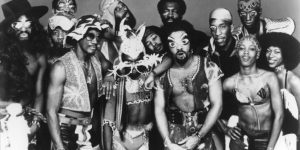CRAM SESSION: An intro to alt-metal icons Faith No More
by Michael Rancic
October 13, 2016
Tracing the goth rock roots of alternative metal icons Faith No More.
You Don’t Remember? I Won’t Let You Forget
—
Beginning in 1983, Faith No More made a career of carefully mining a unique sound that wasn’t anticipated by their peers, by their scene, nor by precedent. Hailing from the same city as Chrome, Crime, The Dead Kennedys, Metallica, and Sly and the Family Stone, this band of Bay area punks found the point where funk, jazz, metal, and goth all intersected and pushed it to various extremes.
Though their lineup went through numerous changes throughout their career, Faith No More would go on to release 7 albums. They broke up in 1998, but reformed in 2009, releasing their most recent record, Sol Invictus, in 2015. More recently, they’ve been reissuing their back catalogue on vinyl, with their debut record, We Care A Lot, arriving in August, and King For A Day… Fool For A Lifetime and Album Of The Year coming out last month.
The origins of Faith No More, and the origin of their sound, begins with goth. No, seriously.
If goth music is a haunted house, then Faith No More was that one guy who leaned a little too long on that one bookshelf, opening a secret passageway that revealed tunnels to every other conceivable musical style.
Below, we trace those tunnels through the band’s illustrious 33 year career.
Quiet in Heaven (1983)
Before they were Faith No More, they were Faith No Man. After throwing around a few different names, vocalist/guitarist Mike “The Man” Morris, bassist Billy Gould, keyboardist Wade Worthington and percussionist Mike Bordin recorded “Quiet in Heaven” and “Song Of Liberty” in 1983.
Faith No Man were key to the development of Faith No More, a significant step in solidifying the core creative membership of Gould, Bordin and Roddy Bottum, the latter of whom took over on keys later that year once Worthington departed.
Faith No Man also helped set the tone for Faith No More sonically, establishing the gothic elements of the group that never really vanished. Gothic literature is defined by a strong predilection for exaggeration, and goth rock works much in the same way. Gould’s bass sits high in the mix, alongside Bordin’s dubby, reverb-laden drums (like Public Image Limited or Killing Joke before them), while the synths hang in the air, setting the mood. Spidery guitar lines that are part McKay, part McGeoch, weave around haunted vocals. Goth would remain a part of the band’s DNA moving forward, and continue to rear its head throughout the rest of their career.
“We Care A Lot” (We Care A Lot, 1985)
Depending on how you look at it, Morris was either kicked out of Faith No Man and the group changed their name to reflect the membership (“The Man” was No More), or everyone in Faith No Man but Morris left to start Faith No More. Bordin, Bottum and Gould cycled through various vocalists and guitarists from the local scene (including Courtney Love) before settling on guitarist Jim Martin (who played with Bordin and childhood friend Cliff Burton in EZ Street) and vocalist Chuck Mosley (who’d played with Gould in an earlier outfit called The Animated).
Though the song would go through many iterations throughout the band’s career, this version, from the 1985 album of the same name, is the definitive. Martin was a metalhead through and through, and his effect on the band was immediate, firing away brilliant riffs and leads almost as quickly as he could concoct them. His guitar style was very in-your-face, which distanced the band from their post-punk origins, but still stayed true to the ultimate goal of stylish exaggeration. In retrospect, vocalist Chuck Mosley got a raw deal by being constantly compared to his successor, Mike Patton, but it’s exactly Mosley’s lack of range, that lack of depth, his sun-baked Californian fer sher that sells the song’s sarcasm so well.
“Faster Disco” (Introduce Yourself, 1987)
Though it was their second true album, Introduce Yourself was the band’s 1987 major label debut. The title is a sort of cheeky nod to the band’s proper “introduction” to a wider audience.
It is by all accounts a better first impression than their previous record, and the opening track “Faster Disco” wastes no time in making that point. The intro recalls the muscular goth rock of Killing Joke, with Bottum’s keys shoring up the moodiness. Mosley contorts his voice into a croon to great effect during the verses, but keeps his distance during the song’s chorus, which is sent skyward thanks to Martin’s leads.
“Epic” (The Real Thing, 1989)
The band’s biggest single, from an album that signalled the beginning of their most stable creative period. After Introduce Yourself, Faith No More fired Mosley because of his substance abuse issues, and aforementioned lack of vocal range. They hired Mike Patton in his place, after Martin had heard Patton’s vocals on an early Mr. Bungle release, and quickly got to work on The Real Thing. As good as Mosley was, Patton was better, and more equipped to follow and in some cases push the band in the extremes they’d been moving toward.
It’s both completely understandable and mind-baffling that a song like “Epic” would send the band careening toward popularity. “Epic” sustains the mocking tone of “We Care A Lot,” with Patton convincingly parroting the white boy rap of fellow funk rockers Red Hot Chili Peppers with purposefully opaque lyrics. Martin gets free reign to add stylish flairs, complete with guitar solo, to the rest of the song, while Bottum subs out his usual billowing synths for punchy horn parts. To top it off, the band finish with a coda worthy of “Layla,” reaffirming their goth sensibilities with pure excess.
“A Small Victory” (Angel Dust, 1992)
“Midlife Crisis” might be the more popular favourite from the Angel Dust days, but “A Small Victory” is the band at their very best. The third single off the album, Faith No More considered it to be their most radio-friendly (but that didn’t mean it didn’t have teeth). Bottum’s keys establish the melody early on, which Patton mimics vocally as the band come in beneath as support. This dynamic repeats, building each time Patton arrives at the words “It shouldn’t bother me/ but it does.” Bottum’s canned synthy record scratches turn into cash register noises into air raid sirens, plummeting the song into chaos. They wrap it up not with a chorus or another verse, but with a spoken-word passage. “A Small Victory” is a wonder for distilling Faith No More’s weirdness in a such a catchy pop gem.
“Be Aggressive” (Angel Dust, 1992)
Bottum came out of the closet in 1992, and wrote this song figuring he’d get a kick out of hearing Patton sing “I swallow” to a stadium full of dudes. Like their cover of the Commodores’ “Easy,” which was recorded during the same sessions and released as the final single for Angel Dust, “Be Aggressive” represents an attempt to subvert the heteronormative, male dominated, rock climate they found themselves in after the huge success of The Real Thing.
The song begins with heavy organ before breaking out into a wah-wah funk frenzy. Martin was reportedly not happy with how much of the writing process for Angel Dust went, but his performance here gives no indication. The chorus is sung, cheerleader style, by a group of uncredited women, adding to the humour of the song while also reinforcing the over-the-top nature of the band and their growing predisposition toward pastiche. Transforming a football cheer into an anthem for sex between two men is the simple kind of perversion that Faith No More are best at.
“Star A.D.” (King For A Day… Fool For A Lifetime, 1995)
With Martin out of the picture following the Angel Dust tour, Faith No More turned to Trey Spruance, Patton’s bandmate in Mr. Bungle, to fill in on guitar for King For A Day… Fool For A Lifetime. Though Spruance high-tailed it out of the band right after making the record, his influence, or maybe the influence of having two-fifths of Mr. Bungle in Faith No More, was undeniable.
His crazed, Chuck Avery guitar style is all over “Star A.D.“ which finds the Faith No More in big band jazz rock territory. Bottum was not always present during the writing and recording of King For A Day, as it coincided with the death of his father, so the band had to creatively think of ways to fill the space he’d normally occupy. Some songs, like album opener, “Get Out,” feature no keys whatsoever. The horn section here is an inspired move, and allowed the band to stretch themselves into jazzier territory. The jazz worked hand-in-hand with camp, as the horn arrangements, complete with sax solo, adding a thin veneer of flashy “showbiz” to a song about posthumously becoming a legend.
“King For A Day” (King For A Day… Fool For A Lifetime, 1995)
On the surface the “acoustic groove” underpinning the title track from King For A Day sounds too straightfaced and sincere for a band like Faith No More. The song seems almost too simple, but it’s arguably one of the best written songs on the album, and the best example of the band firing on all cylinders.
Spruance does his best to fit in here, holding down the rhythm in tandem with Borden, while Gould’s bass establishes the melody, and Bottum offers both an ascending synthy counterpoint and added colour via piano. Vocally, Patton also seems pretty inconspicuous, but it’s ultimately in favour of the lyrics, which are sung from the perspective of a man dying at a party and no one noticing. As each chorus arrives, the circular groove circles closer and closer around the drain, climaxing with a mighty heavy death rattle.
“Stripsearch” (Album Of The Year, 1997)
Needing to fill the role of guitar player once again, the band turned to Gould’s friend and former roommate, Jon Hudson. By this point, Faith No More were ready to tap out, exhausted with the project and with each other, and the material sounds appropriately anemic. Hudson has less of a stylistic footprint than his predecessors, and the album suffers from a similar lack of definitive style.
The last single from Album Of The Year, “Stripsearch” is one of the record’s few highlights. With its dark, almost trip-hoppy vibe, “Stripsearch” sounds like an early precursor to Patton’s later material as Peeping Tom, though the songwriting is only credited to Bordin, Gould and Hudson. Having been born out of dub-influenced, early 80s gothic rock, it’s interesting to hear the band arrive at the similarly dub-inspired trip-hop right at its peak, a testament to their ability to stay relevant. “Stripsearch” wasn’t intended to be their last single, but in 1998, Faith No More called it quits.
“Matador” (Sol Invictus, 2015)
After more than ten years apart, Faith No More set aside their differences and regrouped in 2009 to tour through Europe. Rather than forcing themselves into the studio immediately, Borden, Bottum, Gould, Hudson and Patton waited until they had found their creative spark again, finally convening to make a record in 2014. The result, Sol Invictus, was the band’s first new album in 18 years.
Like much of the record, lyrically “Matador” seems to be addressing the group’s split and reformation. Musically, what we get is a kind of sinister tour of Faith No More through the years, with some new tricks added for fun. The song plays out similarly to “King For A Day,” though this time it’s soundtracking a resurrection rather than a death.
The first half of “Matador” features the guitar and piano working in step, with Patton helping to establish the morose mood. Bordin stomps into the second half, which Gould compliments with a funky bassline that coaxes out the closest thing to a rap that Patton has done for Faith No More in ages. As Patton keeps the dramatics at eleven with an operatic style (not unlike his work in Mondo Cane), Hudson, to his credit, sounds more inspired than ever. He holds the song together – gone is the generic chug-a-lug of his Album Of The Year fretwork, having made way for a much more inventive, and frankly flashy, style, befitting a band of truly excellent and talented players.
Tags: Music, Featured, Beginner's Guide, cram session, Faith No More





